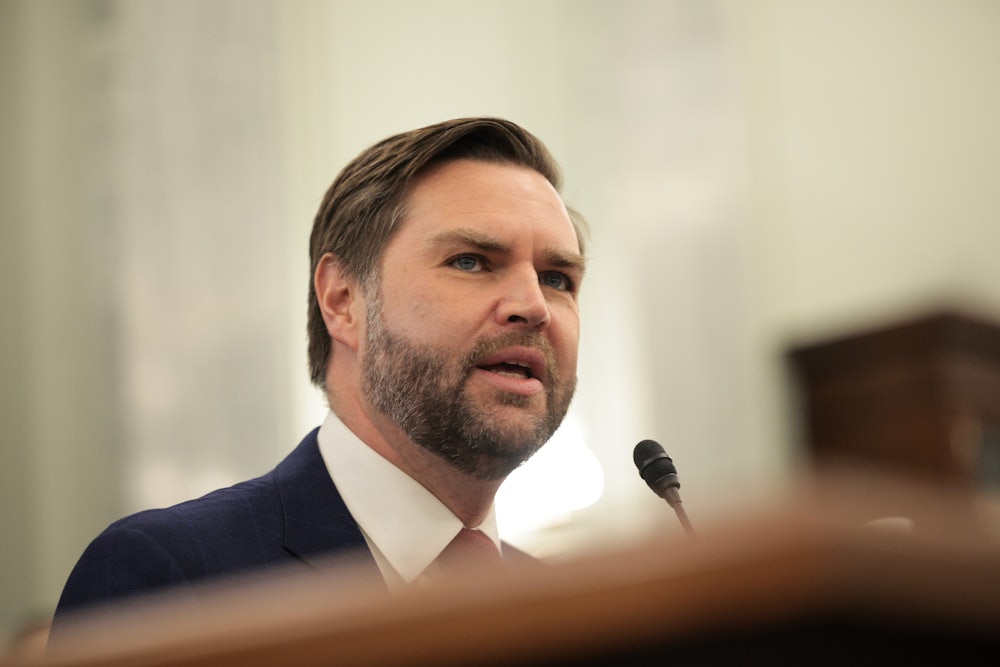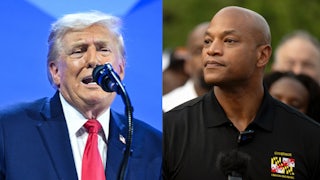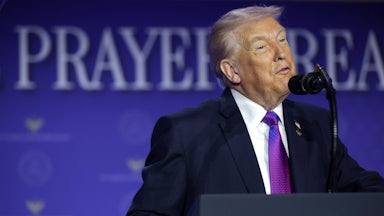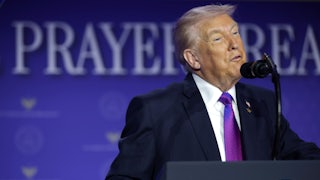The other day, JD Vance sought to reconcile President Donald Trump’s “America First” vision with the tenets of Christianity. Vance argued for a “Christian concept” that orders our ethical obligations in a series of concentric circles, starting with love of family, then out to love of neighbor, then to community and nation, and only then out to the rest of the world. Vance claimed the left has “inverted that,” casting Trumpism as more faithful to the allegedly Christian notion he’d outlined, because it puts “American citizens first.”
This was sharply criticized online, leading Vance to defend it by citing the concept of “ordo amoris.” That means “order of love”: Even if we are called upon to love all people, the practical limitations on the help we can offer others directs us to prioritize aid to those nearest to us.
Now another authority of sorts has weighed in on Vance’s defense of Trumpism: Pope Francis. In a remarkable letter, Pope Francis condemned the Trump administration over “mass deportations” and even indirectly criticized Vance’s use of ordo amoris to defend Trumpist nationalism.
I am not qualified to judge this as a theological dispute. However, godless secular liberals can learn a lot from this argument, because it exposes some ugly truths about “America First” Trumpism—and about the high-minded-sounding justifications that Vance is using to paper them over.
In his response, Pope Francis recognizes that nations and communities must defend themselves from serious or violent criminal migrants. But he condemns the broad conflation of undocumented status with “criminality,” a clear rebuke of Trumpists who tar all migrants who illegally cross our borders as criminals by definition.
Pope Francis writes:
The act of deporting people who in many cases have left their own land for reasons of extreme poverty, insecurity, exploitation, persecution or serious deterioration of the environment, damages the dignity of many men and women, and of entire families, and places them in a state of particular vulnerability and defenselessness.
Pope Francis also asserts that immigration policy must balance the regulation of migration with a recognition of the “equal dignity of every human being.” And he faults Vance’s use of ordo amoris to justify Trumpism.
“Christian love is not a concentric expansion of interests that little by little extend to other persons and groups,” Pope Francis writes. “The true ordo amoris that must be promoted is that which we discover by meditating constantly on the parable of the ‘Good Samaritan,’ that is, by meditating on the love that builds a fraternity open to all, without exception.”
Here’s video of Vance:
JD VANCE: There is a Christian concept that you love your family and then you love your neighbor, and then you love your community, and then you love your fellow citizens, and then after that, prioritize the rest of the world
— Jack Poso 🇺🇸 (@JackPosobiec) January 30, 2025
A lot of the far left has completely inverted that pic.twitter.com/XkoTiKgq3g
So what should we make of all this?
First, Pope Francis correctly identified a big problem with Vance’s defense of Trumpism. Vance wants us to believe that Trump’s immigration policies reflect a good-faith ordering of our ethical obligations: Trump might not want to deport all undocumented immigrants, but this is required of him by his proper duty to American citizens.
But there is no way to reconcile Vance’s innocent rendering of “America First” with what we’re seeing right now. Trump’s policies are built on a massive ratcheting back or withdrawal of our obligations to enormous numbers of people outside our borders—or outside our legal structures—who are making moral appeals on us, appeals that the United States under administrations of both parties has recognized for decades. These policies represent a near-total forswearing of those obligations, a declaration that we are embarked on a new phase of self-enrichment that is almost entirely unbound by them.
Trump has suspended all refugee admissions. He’s ending protected status in the U.S. for hundreds of thousands of immigrants facing calamities in home countries. He’s attempting to deport millions who are not serious or violent criminals. He and Elon Musk are gutting foreign aid so deeply and haphazardly that it’s already producing new humanitarian horrors, despite the aid representing a tiny fraction of our budget. Vance can’t seriously map any of this onto his “concentric circles” doctrine.
It’s already clear that these policies don’t actually benefit the Americans who are supposed to be “first” here. Refugees, beneficiaries of humanitarian protections, and longtime undocumented residents revitalize stagnating areas, contribute to our economy, and are deeply intertwined with American communities. Deporting noncriminal migrants diverts resources away from serious criminals.
But even if Vance doesn’t agree with me on all that, there is no way he can assert with a straight face that in pursuing those initiatives, Trump is in some considered, Solomon-like sense balancing their humanitarian consequences against his ethical obligations to Americans, and sagely giving more weight to the latter. Instead, Trump is in effect declaring that the consequences faced by the victims of these policies shouldn’t weigh on us in the slightest.
We just learned from the U.S. Agency for International Development’s inspector general that Trump’s cuts to the agency have put nearly $500 million of food assistance at risk of spoilage. As former USAID official Jeremy Konyndyk tells me, it’s likely this food is bound for places suffering from “active famine” and “major food emergencies.” The Trump-Musk cuts evince an extraordinarily wanton lack of concern for the global poor. They practically proclaim this proudly. This doesn’t carefully relegate the destitute to an outer ring of obligation in any deliberative way. The idea is preposterous.
It won’t do to overlook this. The New York Times’ Ross Douthat, to his credit, argues that the Trump-Musk cuts to USAID cannot be justified with Vance’s invocation of “ordo amoris,” given how tiny the sacrifice Americans make to fund it, relative to the good it does in the world. But Douthat still seems to believe Trump is committing a mere policy error in cutting USAID—a miscalculation of sorts—as opposed to deliberately renouncing our obligations to the global poor as almost an end in itself. You can’t look at the pile-up of all these policies and deny that this full-scale renunciation is underway, let alone discern any good-faith system of values behind it.
All of this gets at another Vance error. He claims that the “far left” has the circles of obligation backward, that they “seem to hate the citizens of their own country, and care more about people outside their own borders.” Judging by what Vance might be expected to mean by “far left,” he appears to be referencing cosmopolitan liberals. And yes, we do believe the nation should strive to find ways to let in more migrants in a manner compatible with serving the national interest, both because that is eminently achievable and because what Pope Francis calls the “dignity of every human person” calls on us to attempt it.
But whether Vance knows it or not, the cosmopolitan tradition also has a lot to say about the proper ordering of obligations that he himself references, and it’s not what he claims. As Martha Nussbaum details in her book on that tradition, cosmopolitan thought going back to Cicero provides the resources to cultivate a patriotism that is “compatible with strong familial, friendly, and personal love” but also “builds ties of recognition and concern with people outside our national borders.” This notion, Nussbaum writes, explicitly does recognize deep obligations to those closest to us, to community and nation, and sees those obligations as a source of richness in life, but it also forthrightly faces up to our obligations to those on the far outer peripheries.
Cosmopolitan liberalism accepts the challenge of trying to find the right balance between those imperatives; indeed, that’s what makes it attractive. Vance’s claim is that liberals get this balance wrong, but he and MAGA don’t actually take on the challenge of trying to get it right. They cravenly shrug it off entirely.
Pope Francis questions Vance’s ethical schema by arguing that extended meditation on the parable of the Good Samaritan will ultimately cut against it. By this I think he means that the good Christian continually attempts, through reflection, to expand his or her sense of obligation to ever more distant and alien outer rings of strangers and “others” because the “dignity of every human person” requires as much.
This is what the good secular cosmopolitan liberal does as well. As political theorist Matt McManus points out, the true contrast between MAGA and cosmopolitan liberalism is that MAGA does not acknowledge that those obligations to outsiders exist on any point on Vance’s spectrum. Instead, McManus notes, MAGA actively declares that “we can do harm to others if it advances the interests of those we align with.”
That’s exactly what many of Trump’s policies are attempting to do, and it represents the real MAGA ethic. It’s the one Vance is trying to disguise with high-toned dissembling. And it’s the one Pope Francis just laid bare.






